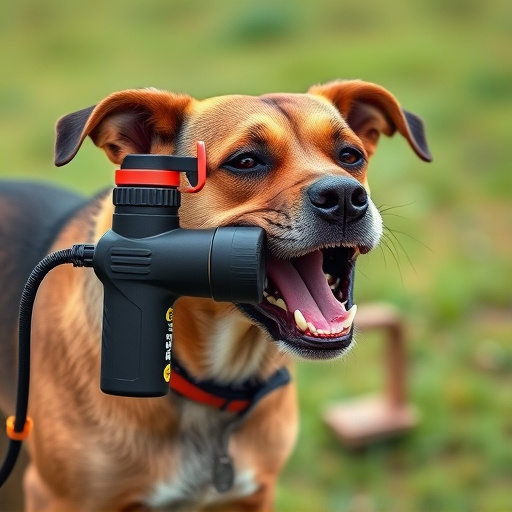Storing pepper spray properly at home is crucial for both safety and legal compliance. Follow local regulations, keep it out of reach of children and pets, store in a cool, dry place, and maintain according to manufacturer instructions. Understand state-specific guidelines regarding possession and usage, using it only as a last resort after exhausting non-lethal methods. Regularly inspect the spray for damage or leakage to ensure effectiveness and safety.
Animal control spray, particularly pepper spray, has emerged as a controversial yet effective tool for homeowners facing aggressive animal encounters. This comprehensive guide delves into the legal framework surrounding its use, offering insights into state-specific regulations that dictate home defense. We explore when and how pepper spray can be legally employed while emphasizing responsible usage and storage techniques to ensure safety and prevent accidental discharge. Learn the best practices for storing pepper spray properly at home, fostering a secure living environment.
- Understanding Pepper Spray for Animal Control: Legal Framework and Regulations
- When is Pepper Spray Legal for Home Use? State-Specific Guidelines
- Storing Your Pepper Spray Safely: Tips to Prevent Accidental Discharge
- Responsible Usage: Techniques and Precautions for Effective Animal Deterrence
Understanding Pepper Spray for Animal Control: Legal Framework and Regulations
Pepper spray, a powerful tool for animal control, is designed to temporarily incapacitate or deter aggressive animals without causing permanent harm. Understanding its legal use and proper storage is crucial for responsible ownership. In many regions, pepper spray is regulated under laws aimed at ensuring public safety and preventing misuse. These regulations often dictate who can possess, carry, and use such sprays, as well as the types of animals they can be employed against. For instance, some areas permit their use only by trained professionals, like law enforcement or wildlife officers, while others allow licensed individuals to protect themselves from specific dangerous animal encounters.
When not in use, storing pepper spray properly at home is essential. This involves keeping it out of reach of children and pets, in a cool, dry place, and adhering to manufacturer guidelines. Proper storage ensures the spray remains effective when needed and reduces the risk of accidental discharge or contamination. Additionally, regular inspection and maintenance can prevent any potential issues with the spray mechanism. Staying informed about local laws and safe handling practices is vital for anyone considering using pepper spray for animal control.
When is Pepper Spray Legal for Home Use? State-Specific Guidelines
In many jurisdictions, the use of pepper spray for self-defense in one’s home is legal under certain conditions. The key factors often involve the purpose for its use and the specific regulations within each state or region. Homeowners typically need to demonstrate a reasonable fear of imminent harm or a history of harassment or threats from an individual entering their property. This distinction ensures that pepper spray is employed as a last resort in situations where other means of protection have failed or are unavailable.
Each state has its own set of guidelines governing the legal use and storage of pepper spray. Generally, these rules dictate who can possess it, how much can be purchased, and where it can be stored. Homeowners should familiarize themselves with local laws to ensure they’re in compliance. Storing pepper spray properly at home involves keeping it out of reach of children and pets, securing it in a locked cabinet or safe, and maintaining its expiration date for effectiveness. Adhering to these state-specific guidelines is crucial to avoid legal repercussions and ensure the spray remains a viable option for personal protection if needed.
Storing Your Pepper Spray Safely: Tips to Prevent Accidental Discharge
Storing your pepper spray properly is crucial to prevent accidental discharge and ensure its longevity. Keep it out of reach of children and pets by locking it up in a secure, high cabinet or safe. Ideally, store it away from heat sources, direct sunlight, and extreme temperatures, as these can compromise the spray’s effectiveness. Use a cool, dry place like a kitchen or bathroom cabinet.
To further prevent accidental triggers, consider adding child-proof locks to your storage area. Keep extra cans in their original packaging, with the nozzle covered by the cap. Regularly inspect the spray for any signs of damage or leakage and replace it if necessary. Always remember that proper storage is just as important as knowing how to use pepper spray effectively for animal control.
Responsible Usage: Techniques and Precautions for Effective Animal Deterrence
In the context of animal control spray, responsible usage involves understanding and adhering to techniques and precautions that ensure its effectiveness while minimizing harm to both animals and humans. The key lies in employing these sprays as a last resort when other non-lethal methods have failed or are not feasible. It’s crucial to select an appropriate animal deterrent spray suited for the specific issue at hand, whether it’s dealing with dogs, cats, or wildlife.
Proper storage of pepper spray at home is another vital aspect of responsible usage. Pepper spray should be kept in a secure, high-up location, out of reach of children and pets. It’s recommended to store them in cool, dry places, away from direct sunlight, heat sources, and moisture. Additionally, regularly checking the expiration dates and replacing the spray according to manufacturer guidelines is essential for maintaining its potency and safety.
While pepper spray can be an effective tool for animal control, it’s crucial to understand its legal boundaries and employ responsible usage practices. Each state has specific guidelines regarding home use, so it’s essential to check local regulations before purchasing. Storing pepper spray properly at home is also critical to prevent accidental discharge; follow the provided tips for safe keeping. Ultimately, using pepper spray should be a last resort, employing techniques like noise makers and visual deterrents first. By adhering to these practices, you can ensure its effectiveness while minimizing potential risks.
